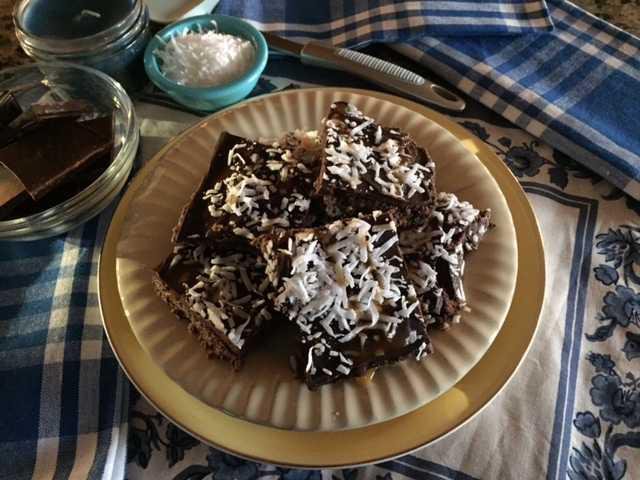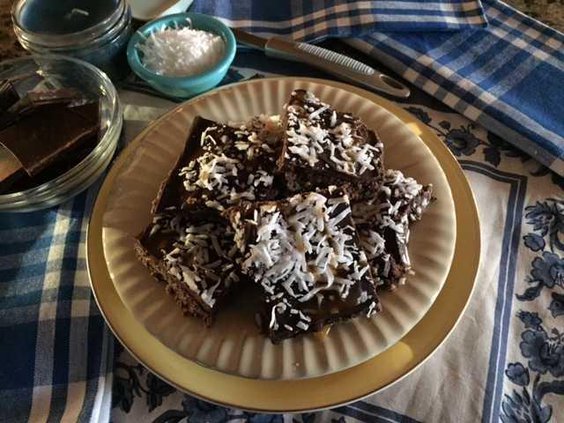"Decadent" describes well this ultra-sweet dessert. The fact it requires no baking adds to its popularity in my recipe collection. The taste may imply a lot of effort or fancy ingredients are needed, but that is not the case.
My best tip as you begin: Measure as precisely as possible and place all ingredients separately in bowls. Also, have a place in your refrigerator ready and cleared for a seamless transfer. This exceptional dessert is created in a few short steps.
After refrigerating, cut into large or small squares, with or without garnishes of coconut, toasted almonds or caramel. The hard part will be waiting two hours for it to chill to perfection.
***
NO-BAKE CHOCOLATE BARS
2 cups chocolate graham crackers (about 13-14 whole crackers), crushed into fine crumbs
cup brown sugar, not packed
1 cups powdered/confection sugar
1 cup butter, softened (not margarine)
1 cup chunky/crunchy peanut butter
teaspoon real vanilla
10 ounces dark chocolate chips or broken bars (approximately 2 cups), melted
Optional: cup shredded coconut (can be toasted)
Caramel syrup to taste
Sliced almonds, toasted
In food processor or sealable plastic bag, finely crush crackers. In large mixing bowl, blend well the graham crackers and sugars. Fold in butter, peanut butter and vanilla. Slowly stir well to incorporate all ingredients.
Butter or spray a 9-by-13 glass baking pan. Pour mixture into prepared baking pan and pat down, making sure dough is evenly distributed. Set aside.
In microwavable container, melt the dark chocolate in your microwave for 60-90 seconds. Watch so it doesn't burn or liquefy. Remove from microwave and stir until smooth. Starting in the middle, pour melted chocolate over graham cracker mixture, again making sure it is evenly spread to the edges.
Sprinkle coconut if you desire, and drizzle caramel topping evenly back and forth across the pan to top. Finish with sliced, toasted almonds.
Transfer to your refrigerator and chill for 1-2 hours.
Cut into desired portions and serve. Any remaining dessert bars should be refrigerated.
My best tip as you begin: Measure as precisely as possible and place all ingredients separately in bowls. Also, have a place in your refrigerator ready and cleared for a seamless transfer. This exceptional dessert is created in a few short steps.
After refrigerating, cut into large or small squares, with or without garnishes of coconut, toasted almonds or caramel. The hard part will be waiting two hours for it to chill to perfection.
***
NO-BAKE CHOCOLATE BARS
2 cups chocolate graham crackers (about 13-14 whole crackers), crushed into fine crumbs
cup brown sugar, not packed
1 cups powdered/confection sugar
1 cup butter, softened (not margarine)
1 cup chunky/crunchy peanut butter
teaspoon real vanilla
10 ounces dark chocolate chips or broken bars (approximately 2 cups), melted
Optional: cup shredded coconut (can be toasted)
Caramel syrup to taste
Sliced almonds, toasted
In food processor or sealable plastic bag, finely crush crackers. In large mixing bowl, blend well the graham crackers and sugars. Fold in butter, peanut butter and vanilla. Slowly stir well to incorporate all ingredients.
Butter or spray a 9-by-13 glass baking pan. Pour mixture into prepared baking pan and pat down, making sure dough is evenly distributed. Set aside.
In microwavable container, melt the dark chocolate in your microwave for 60-90 seconds. Watch so it doesn't burn or liquefy. Remove from microwave and stir until smooth. Starting in the middle, pour melted chocolate over graham cracker mixture, again making sure it is evenly spread to the edges.
Sprinkle coconut if you desire, and drizzle caramel topping evenly back and forth across the pan to top. Finish with sliced, toasted almonds.
Transfer to your refrigerator and chill for 1-2 hours.
Cut into desired portions and serve. Any remaining dessert bars should be refrigerated.



